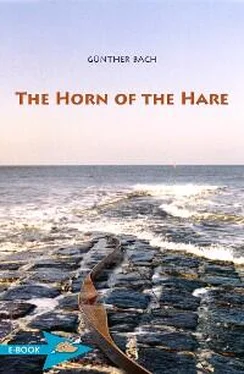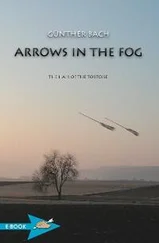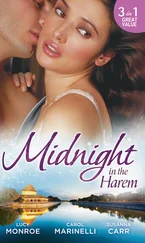GÜNTHER BACH
THE HORN OF THE HARE
A NOVEL OF ARCHERY

VERLAG ANGELIKA HÖRNIG
Günther Bach
The Horn of the Hare
© 2000 by Verlag Angelika Hörnig
All rights reserved.
No part of this book may be reproduced or transmitted
in any form or by any means, electronic or mechanical,
without the written permission of the publisher.
Illustrations: Günther Bach
Translation: Robert Dohrenwend
Cover design: Angelika Hörnig
Lecturer: Mitch Cohen
© 2012 ebook
ISBN: 978-3-938921-25-8
Verlag Angelika Hörnig
Siebenpfeifferstr. 18
D-67071 Ludwigshafen
Germany
www.archery.de
Table of Contents
Foreword
1
2
3
4
5
6
7
8
9
10
11
12
13
14
15
16
17
18
19
20
21
22
23
24
25
26
27
28
29
30
31
32
33
34
35
36
37
38
Author
Advertising
“Perhaps feelings are somewhat uncertain ,
but there‘s no help for it ,
we have to depend on them anyway.“
Johannes Bobrowski
FOREWORD
When this book was written, it was impossible to get it published in the part of Germany where I lived at that time.
The manuscript lay in a drawer for almost twenty years and I only occasionally glanced at the pages while they become increasingly brittle as time passed.
From today’s viewpoint, it is hard for me to describe to an American reader the conditions under which people lived in East Germany (DDR), a state which called itself democratic, mocking those who had to live there.
When the Second World War came to an end, I was ten years old. I had grown up in a small city 900 years old with many Gothic brick churches which had escaped the bombing during the war. My father was a hunter and a man with a deep love of nature. Only poor eyesight kept him from making this passion his career. So he became a banker, weekdays in his office in a neat gray suit, quiet, friendly, and dependable, but on the weekends, he was outdoors in the woods and fields wearing an old green loden coat and an even older shabby felt hat. The hat had a spray of grouse feathers on it whose original colors were no longer recognizable.
There was only a short period in my life when I was allowed to accompany him, but it was long enough for me to become familiar with this, his most lovable side. If really lasting impressions are formed in childhood, impressions which are significant for the rest of your life, then these were mine. Even today when I go into the woods, I am silenced by a feeling of magic which I try not to disturb.
This childhood, peaceful in spite of the war, ended with the end of the war, with white flags at the windows and jeeps and tanks rumbling through the empty streets.
A proclamation by the commandant required the inhabitants of the city to bring all their weapons to the city market square. I was there when my father handed his two hunting weapons, a drilling and double barreled shotgun, to a friendly officer.
The officer laid them in a row with other hunting weapons, with the barrels on the curb of the sidewalk and the butt stocks in the street. Then he waved to a soldier who sat smoking in the turret of a Sherman tank. The soldier drove the tank forward, and my father watched with a stony expression as his expensive and cherished guns were smashed into a heap of bent scrap metal and splintered wood.
For the rest of his life, my father never again owned a weapon. The Americans soon pulled out as a result of the arrangement among the allies. They were followed by the Russians, whose arrival was anticipated with fear and terror by many in the city. And at that time, the first people began to flee to West Germany for fear of what was to come. We stayed in the Soviet occupied zone, which four years later became the so-called German Democratic Republic (DDR).
My home city lay only 100 kilometers away from Berlin, which was located in the middle of the DDR. Berlin – the former capital of the “Third Reich”, proclaimed capital of the DDR, and now finally the capital of reunited Germany, was then the only open way out when things no longer seemed to work out for people. If you couldn’t take it any more, if you could no longer pretend to be satisfied with the restrictions and hypocrisy of this police state where only members of the state party could advance, if you could no longer stand the smug self-satisfaction of the ruling mediocrity, it was good to know that you could always go to Berlin, take a tram to the West, and be free.
Then came August 13, 1961, the day the Berlin Wall went up. Before that date, many thousands of people daily had flowed out of the DDR through West Berlin into the Bundesrepublik, and it was often the best who left. At the time the Wall went up I had finished my architecture studies at the Technical University in Dresden and was working for my certification. When I finally arrived in Berlin with the certification in my pocket, the border had been sealed. A stranger in the city and without friends or anyone I could trust, I found no hole in the Wall anywhere. The way to freedom seemed to be blocked forever.
But the tighter border security became around the DDR, the more ingenious people became in their escape attempts. Many got into West Berlin through the canals or by digging tunnels; lucky ones made it in the trunks of diplomats’ cars.
Entire families entrusted their lives to homemade hot air balloons and attempted to cross the border in the air by night or in fog. Others tried to cross the Baltic in rowboats or on air mattresses to reach a Scandinavian country. All of these desperate acts were considered crimes. They were called “flight from the Republic” and, if you were caught, you were punished with a long prison term. Later the regime issued orders to the border guards to shoot at all escapees. It has never been exactly determined how many escapees were killed in this way. But some people still succeeded in making their way to freedom.
Much later, after I discovered that advancement in my professional career was blocked because I refused to join the official party, I began, like many in that country, to search for something which would repay dedicated effort. I found it in Chinese watercolors and in archery.
This is the period when my story takes place. Even today, I regard it as symbolic of a person’s inability to survive if he must reject everything around him.
Perhaps so. It is better to be for something than to reject everything. The only important thing is to find that which is worth living for.
Günther Bach
Berlin 2003
1
The road lost itself in the snow behind the last houses. Up-slope, the wind had blown the snow over the side of the steep cut and buried the sweetbrier under an impassable snowdrift. Blue shadows lay in the only track which led up the hill to the only house standing at its top. The track then went on in a gradual curve toward the woods. The white surface was undisturbed all around the house. A high drift of loose snow blocked the threshold, and the windows looked cold and black in the clear light of day. A gust of wind drove a swirling, glistening banner of powder snow from the peak of the roof. The leafless birch twigs rustled as they rubbed together. A crow flew over the narrow strip of woods along the steep shore. A glance back over the village revealed white banners of smoke rising vertically above the roofs and then fading just above the scattered groups of trees. Further away in the background, the noon ship to Stralslund trailed a white wake behind it on the bay. And the light was cold which played across the surface of the bay.
Читать дальше













